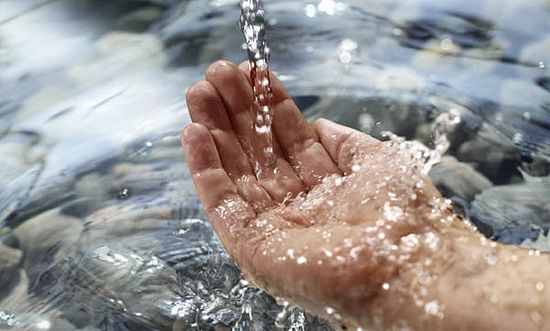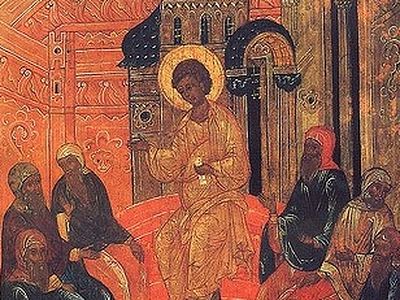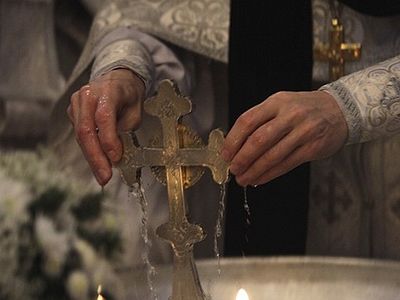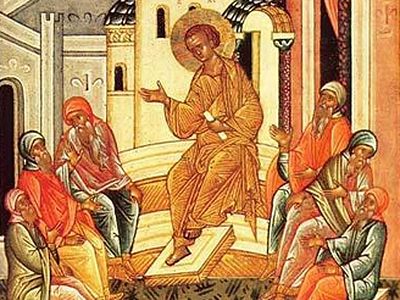In the name of the Father, and the Son, and the Holy Spirit. Amen. CHRIST IS RISEN!
If we come to the daily services and pay close attention to the hymnography in this Paschal period, or if we read through the Pentecostarion (which is a great thing to do at home even outside of Church) we will hear and read about the theme of “water” all throughout this period between Pascha and Pentecost in which the Church uses this liturgical book known as the Pentecostarion. On Pascha we hear “come let us taste a new drink, not miraculous water drawn forth from a barren rock, but the Fount of Immortality, springing from the tomb of Christ, in Him we are established,” and in the succeeding weeks we hear of the Sheep’s Pool, the Well of Jacob, the Pool of Siloam, and the Living Waters of Christ which cause us to never thirst again. We receive this living water in baptism, and in the Cup of Life which is the side of Christ from which flowed blood and water as He hung, triumphantly, on the Cross. He is truly the Fount of Immortality. Thus, in the Dismissal Hymn of Mid-Pentecost we ask Christ for the “waters of piety” to be imparted to our souls.
This feast looks back to Pascha and ahead to Pentecost, originating from both, offering to us, in a sense, a torrent of overflowing grace. The grace of these two amazing feasts is united on this day, and perhaps it is for this reason that this feast was held in especially high esteem by the holy elder Joseph the Hesychast, who was instrumental in renewing the spiritual life on Mt. Athos, and reposed in 1959. He delighted in this feast with the faith of a simple child and awaited with great expectancy and preparation in order to receive these “waters of piety.” It is said that the ascent of his soul and the divine visions he received were especially great on this present feast. Such is the love, mercy and grace of God towards man that are poured out in this Paschal period.
Pentecost pours out such abundant grace that it reaches all the way down to Hades—and so on Pentecost we pray on bended knee for those who have reposed. Christ is the Living Water for both the living and the dead. And the Pentecostarion period concludes with the Sunday of All Saints on which we read from Isaiah 55, that as rain and snow pour out of Heaven and saturate the earth, causing the plants to bud and bringing bread to man, so shall be the Word of God. Whatever proceeds from the mouth of God shall not turn back until all things He wills shall be accomplished. His ways and commandments will prosper, and all peoples, mountains, hills, and trees—indeed, all of creation—shall exalt with joy, and the Lord’s name shall be an everlasting sign for Israel. Of course we know that as the Church we are the New Israel, so we are seeing in Isaiah a promise of God’s everlasting fidelity to us and the promise of His well-spring which can never be quenched.
Even beginning from the Old Testament we see innumerable important references and events involving water. Genesis shows all life beginning and being sustained by water—and again, Christ is the well-spring of life—He invites all who are thirsty to come and drink from Him and to have their thirst quenched from His unquenchable fount. There are also the events of the Red Sea, the Jordan River, etc. These are all prefigurements of the spiritual realities that are revealed in full in the Incarnation of Christ and are available to us without limit within Christ’s Holy Church, which is His very water and life-giving Body.
From the life of Christ, this feast celebrates the time He was found in the Temple at twelve years old in the middle of the Feast of Tabernacles. He spoke concerning His origin from God and the living water that He offers, and He astonished all those who heard Him. Here Christ is celebrated not only as the Spring of Living Water but also as Holy Wisdom, which is of course intimately connected to His living water. We sang tonight: “Thou, the Wisdom of God, didst come to the temple at Mid-feast,” and many other hymns referring to Christ as the Wisdom of God. Some scholars even believe that the Church of the Holy Wisdom, Agia Sophia, in Constantinople celebrated its feast day on this feast of Mid-Pentecost.
In meeting Christ in the Church in worship and in the sacraments we come to know His Wisdom experientially. This wisdom of course, is not that of man, but it is the Divine Wisdom of God—it is the very life of Christ. It is the life-giving water that He pours out into our souls and with which He saturates our entire being. This Wisdom, which is the life of Christ, is humility. The preaching of Christ is foolishness to the world, but all the wisdom of the world is foolishness in the face of the humble Christ Who gives endlessly of Himself to us who are undeserving of His life. But here, in the Church, on this feast, and at all times, we receive His life through our humility and our repentance—our recognition that we absolutely need His energy to bring us again to Paradise. This is Wisdom and this is Life. Come let us taste this new drink.
Christ spoke in the Temple of His divine origin, and Mid-Pentecost continues the glorious celebration of His defeat of death, which emphasizes His divinity for only God Himself can defeat death. Only God IS Life. Today we remember Pascha, but today we also look ahead to the feast of Pentecost. We are reminded of the coming of the Spirit and are emboldened in preparation for receiving the Spirit. This is the summation of the Christian life according to St. Seraphim of Sarov—the acquisition of the Holy Spirit.
And not only do we receive the Spirit—today we prepare moreover to GIVE the Spirit. Christ says “He that believeth on Me, as the Scripture hath said, out of his belly show flow rivers of living water” (John 7:38). After Pentecost the Apostles did not stay in Jerusalem and keep this gift of Life to themselves. They went out into all the world and imparted that which they had received, as they had been commanded by Christ. If Christ has given to us, surely we must give to others. Otherwise, where is Christ in our life? Christ is love and humility. Deal with everyone in love and humility, no matter how it works against our egos, and burns us. This burning is cleansing and is cooled by the water we are receiving from Christ. Elder Joseph loved this feast and the grace it imparts, but his life and legacy demonstrates that he also loved to give the Spirit. His influence is keenly felt on Mt. Athos, in Greece, and even here in America, and throughout the world. This is the mark of the true Christian—he who transmits that which he has received and changes those around him for the sake of Christ.
In his homily on Mid-Pentecost, Fr. Seraphim Rose says if there is anything we learn from this feast it is this: to THIRST. Even in the midst of our rejoicing and feasting on the good things of the earth in these days of Pascha we look ahead to the outpouring of the Spirit—to the good things from above the earth. Indeed, let us seek this Wisdom, and let us thirst for this living water. Thus we sing:
“Having come to the middle of the feast, refresh my thirsty soul with the streams of piety; for Thou, O Savior, didst say to all: Let Him who thirsts come to Me and drink. O Christ our God, Source of Life, glory to Thee.”
In the name of the Father, and the Son, and the Holy Spirit. Amen. CHRIST IS RISEN!






